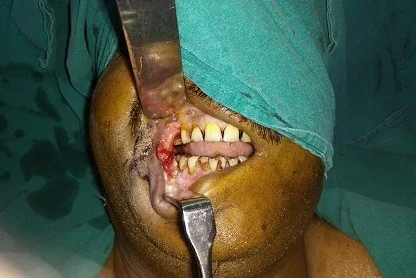
Oral cancer refers to a type of cancer that develops in the tissues of the mouth, throat, or lips. It can occur in any part of the oral cavity, including the tongue, gums, cheeks, and roof or floor of the mouth.Oral cancer is present as a lump or an ulcer in mouth, which gradually increases. Symptoms of oral cancer may include mouth sores that do not heal, persistent pain or discomfort in the mouth, difficulty swallowing, a persistent sore throat, a lump or thickening in the cheek, white or red patches on the gums or tongue, and unexplained weight loss.
How it is performed
The type of surgery performed for oral cancer will depend on the location and stage of the cancer, and advanced cases require radiotherapy and chemotherapy. One common type of surgery for oral cancer is called a resection, which involves removing the tumor and a margin of healthy tissue around it. This may be done using traditional open surgery or with minimally invasive techniques such as robotic or endoscopic surgery.
During the surgery, the patient will be under general anesthesia. The surgeon will make incisions in the mouth or neck to access the tumor, and carefully remove it along with any surrounding tissue that may contain cancer cells.
If the cancer has spread to nearby lymph nodes, the surgeon may also remove these during the surgery. This is called a neck dissection.
After the tumor and any affected tissue have been removed, the surgeon will close the incisions with stitches. Depending on the location and extent of the surgery, the patient may need to have a feeding tube or tracheostomy tube (a tube that is inserted into the windpipe to help with breathing) temporarily after the surgery.
Why is the surgery done
Oral cancer surgery is done to remove cancerous or precancerous cells from the mouth, throat, or lips. The surgery is done to treat the cancer and prevent it from spreading to other parts of the body.
The goals of oral cancer surgery may include:
Removing the cancerous cells
Preventing the cancer from spreading
Restoring function to the mouth and throat
Improving quality of life by reducing pain, difficulty in eating/drinking or speaking
What to expect post surgery
After oral cancer surgery, the patient can expect some discomfort and a recovery period that may last several weeks or months, depending on the extent of the surgery. Here are some general things to expect post oral cancer surgery:
- It is normal to experience some pain and discomfort after the surgery.
- Swelling and bruising around the surgical site are also common.
- The patient will likely need to modify their diet, may need to eat soft foods, liquids or pureed foods, and avoid hard, crunchy or spicy foods.
- The patient may experience some difficulty with speech and swallowing after the surgery, especially if the surgery involved the tongue or throat.
- The patient will need to attend follow-up appointments with the surgeon to monitor the healing progress and to check for signs of recurrence.
- The patient may need to undergo rehabilitation to restore function, such as speech therapy, occupational therapy, or physical therapy.
Risks associated with the surgery
As with any surgical procedure, oral cancer surgery carries some risks and potential complications.
- Bleeding during and after surgery
- Risk of infection at the surgical site
- Nerve damage which may cause numbness, weakness, or loss of sensation in the face or neck.
- Surgery may result in scarring and disfigurement
- Difficulty with eating and swallowing:
- Speech problems
- Breathing problems
- Allergic reactions to Anesthesia risks
